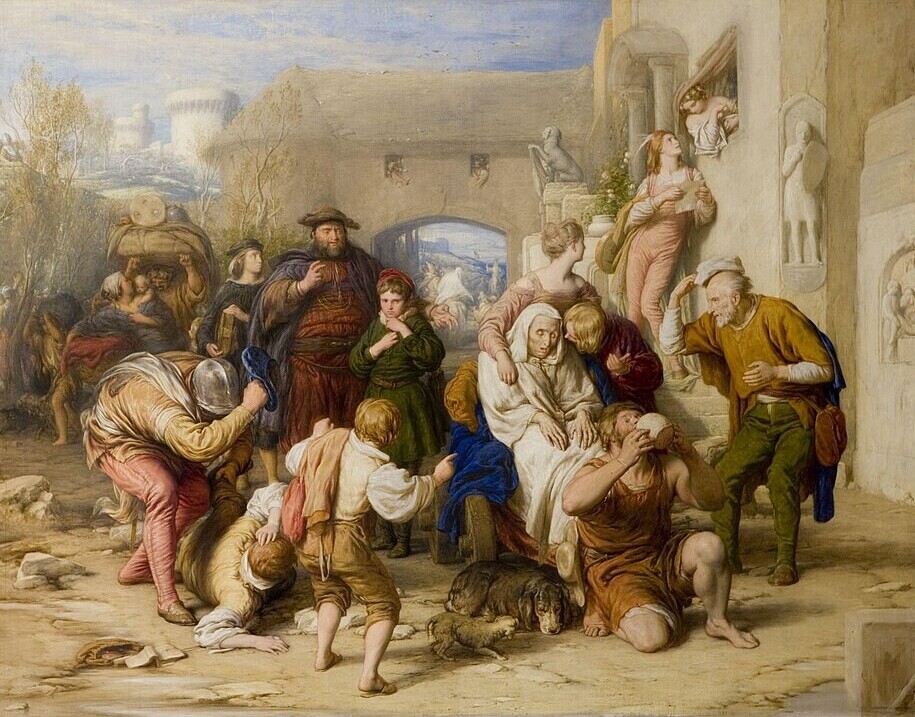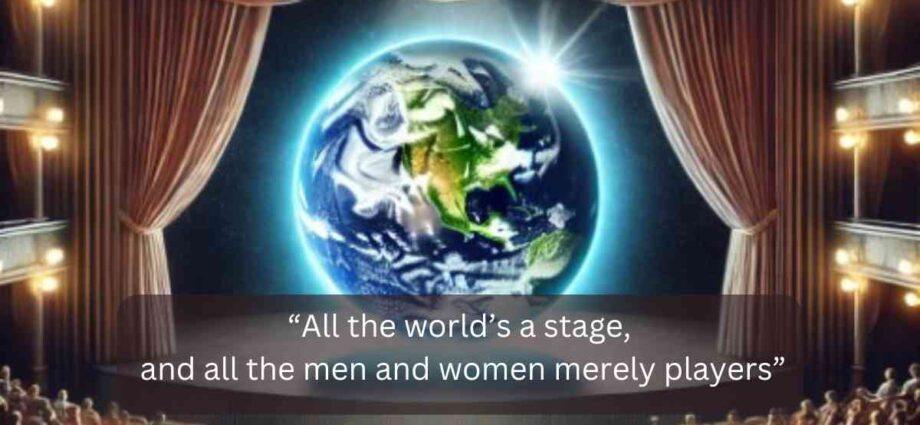This week, our Sunday Shakespeare lesson takes us to one of the most famous quotes from As You Like It: “All the world’s a stage, and all the men and women merely players.”
This is one of my favourite Shakespeare quotes as it incorporates a message that I believe about the fundamental nature of reality, but you’ll see that further down.
However, in more traditional ways, this is one of Shakespeare’s more brilliant metaphors which on the surface, is quite easy to understand. It tells us that life is like a stage, with everyone playing different roles throughout their lives. It then goes on to describe the human journey through life.
This quote is a great one to start with when looking at Shakespeare and is an easy way for students to think about their character development, both on and off the stage. I’ve found too that it’s perfect for inspiring students to explore the idea that they, too, are constantly shifting between different “roles” in life – student, sibling, son/daughter, friend, etc.

Which role will you play?
In context
As You Like It is a Shakespearean comedy, filled with themes of love, identity, and transformation. The play follows the story of Rosalind, who is banished from her uncle’s court and flees to the Forest of Arden. Disguised as a young man named Ganymede, she encounters her love interest, Orlando, who is also hiding in the forest.
In the Forest of Arden, multiple romantic entanglements unfold, and characters explore themes of freedom, love, and self-discovery. Similar to Twelfth Night, it is a playful exploration of gender roles and heartfelt moments, which ultimately conclude with a joyful series of marriages and reconciliations.
This iconic line is spoken by Jaques, a servant to the exiled Duke Senior, and one of the main characters in As You Like It. The quote appears in Act 2, Scene 7, during Jaques’ famous “Seven Ages of Man” speech. At this point, Jaques is reflecting on the nature of life and human existence, contemplating the inevitable passage of time. As he observes the world around him, he sees life as a series of stages, each representing a different phase in the human experience. This speech is one of the most philosophical moments in the play, as Jaques ponders the futility and transience of life, like an inevitable curve, starting and ending in helplessness, but also the roles we all play along the way.
Jaques’ view of life focuses on the human condition, reflecting the inevitability of change and the way people often perceive themselves as mere players in the grand play of existence. The seven stages: infancy, childhood, adolescence, adulthood, middle age, old age, and the final stage of life, represent the natural, earthly linear progression of time and its effects on every individual.
Why is this quote important?
The Seven Ages of Man: Shakespeare’s breakdown of life into seven distinct stages, from infancy to old age, has appealed to audiences and scholars across time and it offers a great opportunity to explore how we change and evolve as we grow. It’s perfect for helping students understand character arcs and the journey of transformation although it is not quite the same as the Hero’s Journey, where the transformation is more of an inner transformation due to the character facing their own ‘inner demons’ rather than battling with Old Father Time. Nevertheless, the quote also serves as a reminder that no matter our age or status, we all play our part on the stage of life.
This metaphor gives students an easy and understandable way to approach characterisation, giving them easy-to-follow clues as to how the characters move and sound at different ages. E.g. “mewling and puking”, or “whining schoolboy… creeping like a snail” or “his big manly voice
Turning again toward childish treble”.
On a deeper level, the idea we play different roles throughout life encourages students to think about authenticity, motivation and how characters can embody different personas in different situations.

By William Mulready – [1], Public Domain, https://commons.wikimedia.org/w/index.php?curid=124130980Seven Ages
A more esoteric understanding
From an even deeper, more esoteric perspective, this quote can be seen as an allegory for the human experience being just one part of a larger reality. What if, rather than being the end-all of existence, our lives on Earth are akin to the performance of actors on a stage? In this interpretation, the “world” we experience is merely a stage where our “higher selves” – those non-physical aspects of our consciousness – are playing the roles of humans, interacting within this reality.
You could view this in a similar way to the film The Matrix, where the “real world” exists beyond most of the character’s perceived reality, and our consciousness is temporarily embodied in a physical form. In this analogy, we, the “players,” are living out roles given to us in a grand narrative, unaware of the greater truth. This viewpoint invites a deep reflection on the nature of existence – how we play our roles, how we identify with them, and how, ultimately, we may transcend them to recognise our true, limitless selves.
This layer of interpretation opens up interesting discussions in the classroom, allowing students to explore philosophy, identity, and the metaphysical aspects of life beyond Shakespeare’s original stage metaphor.

By Cygomezm – Official site, Public Domain, https://commons.wikimedia.org/w/index.php?curid=46672499
How can you use this in the classroom?
You can turn this concept into a rich and engaging lesson plan for your students even if you never read As You Like It or learn more about the play. It’s a bit like studying the prologue in Romeo and Juliet, where you can take it out of the play and study it on its own, teaching lots of theatrical ideas and techniques at the same time.
So here are a few ideas for integrating this quote into your teaching:
1. Character exercises: Encourage your students to explore the different “stages” of life and how these could translate into acting choices for voice, facial expressions, motivations and movement. How would a character behave in the “age of man” stage they are performing? For example, how would a character at the “lover” stage behave differently than one at the “soldier” stage and how would an actor represent that with his voice, face and body?
2. Gender reversal: Since Shakespeare deals only with the male of the species, how would your students define the ‘Seven Ages of Woman’ or even of non-gender-specific people?
3. Reflection activities: Ask your students to think about their own lives and the “roles” they play daily. How do their experiences shape who they are in different situations? This could be done through journal prompts or group discussions, exploring the roles they play in their family, community, or school life.
4. Philosophical discussion: Dive into a more esoteric conversation with your students about the roles they play in their lives. Could life itself be a grand performance? Are we really living in ‘The Matrix’ or the Star Trek Holodeck? What happens when we “step off the stage”? This could spark a deeper reflection on the nature of existence and the difference between our physical experience and what some say is our higher consciousness.
The full quote – “The Seven Ages of Man”
Here’s the full quote from Jaques’ speech:
“All the world’s a stage,
And all the men and women merely players;
They have their exits and their entrances;
And one man in his time plays many parts,
His acts being seven ages. At first the infant,
Mewling and puking in the nurse’s arms.
And then the whining schoolboy, with his satchel
And shining morning face, creeping like snail
Unwillingly to school. And then the lover,
Sighing like furnace, with a woeful ballad
Made to his mistress’ eyebrow. Then a soldier,
Full of strange oaths and bearded like the pard,
Jealous in honour, sudden and quick in quarrel,
Seeking the bubble reputation
Even in the cannon’s mouth. And then the justice,
In fair round belly with good capon lined,
With eyes severe and beard of formal cut,
Full of wise saws and modern instances;
And so he plays his part. The sixth age shifts
Into the lean and slippered pantaloon,
With spectacles on nose and pouch on side,
His youthful hose, well saved, a world too wide
For his shrunk shank, and his big manly voice
Turning again toward childish treble, pipes
And whistles in his sound. Last scene of all,
That ends this strange eventful history,
Is second childishness and mere oblivion,
Sans teeth, sans eyes, sans taste, sans everything.”
Related articles
Sunday Shakespeare 1: Nothing will come of nothing



This is such an interesting take on Shakespeare’s “All the world’s a stage”! I really like how you connect it to both acting and the bigger idea of life’s stages. The idea that we’re constantly shifting roles—whether as a parent, student, or friend—is something I can definitely relate to. I’m curious, though—how do you think modern life, like social media, influences how we “perform” different roles? Would love to hear others’ thoughts on this!
Hi Zachary. Thanks for your insights here and I like that you are connecting writing from 400 years ago to today’s modern world and social media! To my mind, this just plays into our hands, since on social media, people can be whoever they choose to be, and they often choose to be someone completely different. Or at least to present that face to the world! I think that would make a really interesting lesson exploring that!
You bring such a thought-provoking perspective to Shakespeare’s famous “All the world’s a stage” speech! I’ve always appreciated the metaphor for life’s different roles, but I love how you go deeper, exploring not just theatrical character development but also the philosophical and even metaphysical dimensions of the idea. The connection to The Matrix really got me thinking—what if we truly are just playing roles, unaware of a bigger reality beyond this “stage”?
Your breakdown of the Seven Ages of Man also makes this concept incredibly accessible, especially for students. The idea of using this speech in the classroom to reflect on personal identity and societal roles is brilliant. It’s a great reminder that Shakespeare wasn’t just writing for entertainment—he was capturing the essence of human existence in ways that are still relevant today.
One question that stuck with me after reading this; do you think Shakespeare intended this speech to be pessimistic, or was he simply making an observation about life’s inevitability?
Hi Don. Thanks for reading the article and taking the time to leave a comment. It is much appreciated. I’m so pleased that you found the article interesting and thought-provoking – that is the idea really. We don’t want to teach our students what to think, but how to think critically about everything. For me, this speech has always been so much more than just about the ages of man, so I’m glad you liked this perspective too. You could read more about that perspective on my other site: thecreativechoice.org and particularly in the article on near-death experiences.
To answer your question, there are many times in Shakespeare’s plays when you could think he was pessimistic, such as in “King Lear” for example, which has a very pessimistic storyline. Many othertimes, his version of ‘good’ triumphs over ‘evil’. I think it’s more a matter of the perspective of the character rather than the author and in this way, Shakespeare captures the nature of humanity in all its many forms.